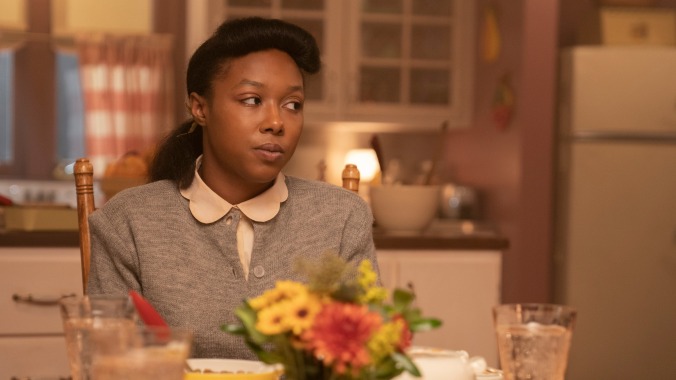This story is of course complicated by Black Americans in Kansas City, who migrated from the southern U.S. and, as Doctor Senator (Glynn Turman) states, are as much a part of this land as the elements. In its fourth season, Fargo maps out thornier territory than ever before, and even ditches the badge-carrying good guy/girl. But that change hasn’t left the show devoid of a moral compass—it’s just shifted that perspective over to a biracial teenager, Ethelrida Pearl Smutny. This perspicacious high-schooler is the narrator in the premiere, and described as the “heart” of the series.
That’s something that E’mryi Crutchfield, who plays Ethelrida in a star-making turn, has mulled over since joining the cast. The actor wasn’t very familiar with the Fargo film or previous seasons of the show—she tells The A.V. Club she was drawn to the challenge it presented. Like her co-star Chris Rock, Crutchfield sought to stretch herself in a more dramatic role than she’d ever played: “I get a lot of younger roles, since I’m 20 and I still look a lot younger. I don’t get offered a lot of dramas like that. To work with such a different piece, it was exciting to challenge myself.”
Crutchfield is aware of just how outsize the characters who make up the rest of this season’s (and every season’s) roster are, but Ethelrida is no shrinking violet. When we first meet the plucky teen, she’s informing us of just how exceptional she is—and how “threatening” the white faculty and administrators at her school find her. For a Black student in mid-century Missouri, being “upstanding” is more dangerous than being “disreputable.” Her name is a mouthful, one that Crutchfield says she relishes in sharing with those around her. “
Ethelrida is very proud of her name. She not only states her first name to introduce herself, but her middle and her last name. Her mom named her, so it means a lot to her. She has to let everyone know, ‘This is who I am, and this is who I won’t be.’ Especially during the 1950s, where her dreams were limited and her goals were limited. But she beat the odds, went through any obstacles she had to, and is staying true to herself.
Ethelrida’s pride in her name is just one of the subtle ways the show’s writers, including Hawley, Stefani Robinson, and Francesca Sloane, make the bright-eyed teen stand out among a cast of capital-C characters. She also represents one of several significant departures this season—Fargo has never had a young Black woman in a lead role. Crutchfield more than holds her own in the by-now-standard star-studded cast that includes Rock, Turman, Jason Schwartzman, and Timothy Olyphant. And she’s given a lot of thought the ways race and the show’s setting inform her character: “Looking at me, you wouldn’t think I’m biracial. That’s a big part of Ethelrida’s character—she doesn’t pass, she doesn’t look biracial, so things aren’t any easier for her. She isn’t closer to the skin color that’s accepted. She takes after her mom, not her dad.” (Two Illinois natives, Andrew Bird and Anti White, play Ethelrida’s parents Thurman and Dibrell, respectively.)
Despite being early in her career, Crutchfield embraces shows with weightier themes; she easily draws parallels from the lives of Black Americans in the 1950s to today.
Going into Fargo, I didn’t realize how necessary this season was, the heavy topics that we’re talking about and how much they mean. I did realize it as we were filming, and I couldn’t be more thankful to be a part of something that’s good, funny, and entertaining, but it’s also talking about real life. Noah did amazing with the writing and how he articulated every character. I’m more than appreciative to talk about hard topics like this. I have younger brothers that look up to me, younger siblings; this is good representation for them, and for people who look like me.
Crutchfield also thinks there’s a lot to mine from the common goals of these groups: Black, white; immigrant, American. “They’re all on the same journey, they’re all trying to fight for the American dream.” The fact that the American dream has historically been denied to some groups will factor into the remaining episodes; as of episode three, “Raddoppiarlo,” tensions between the Fadda family, led by Josto (Jason Schwartzman), and the Cannon Limited (led by Rock’s Loy), are only escalating. The Smutnys’ home life has already been affected—they’re in debt to the Cannons, a fact that’s not lost on Ethelrida’s aunt Zelmare Roulette (Karen Aldridge), who’s on the run with her lover, Swanee Capps (Kelsey Asbille). Ethelrida’s even run afoul of her psychopathic neighbor, Oraetta Mayflower (Jessie Buckley).
Where does the astute Ethelrida fit into the gang war that’s bound to erupt? What does it mean to be the “heart” of a story that is, in many ways, about exclusion? Crutchfield can only share so much at this juncture, but she does say that, as Ethelrida, she is “the glue for everything. I tell this story, I bring you along this journey, and I’m on the journey as well. I’m going through all of it.” And through it all, there’s the fear that Ethelrida might be too smart for her own good—unable to steer clear of the coming chaos.



 Keep scrolling for more great stories from The A.V. Club.
Keep scrolling for more great stories from The A.V. Club.